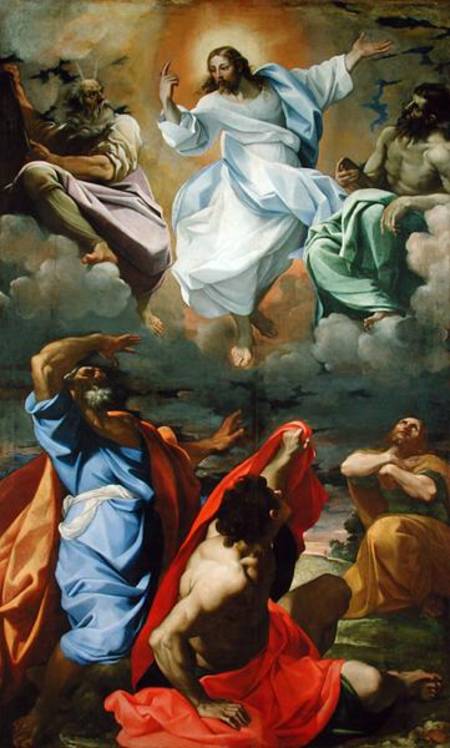(1995)
* * * * *
Martin [Protestant]: It baffles me, Joe, how you Catholics can believe you’re saved by works, when the Bible says “whosoever believeth in him should not perish, but have everlasting life” (Jn 3:16).
Joe [Catholic]: We don’t. Let me explain. First of all, belief in Christ means also to obey Him. This is shown in passages where the opposite of belief is disobedience, such as in 1 Pet 2:7 and Jn 3:36, where “believeth not” (KJV) is often translated “does not obey.” *
* e.g., NASB, RSV, NEB
Martin: But Paul says “by grace are ye saved through faith, and that not of yourselves: it is the gift of God: not of works . . .” (Eph 2:8-9).
Joe: We Catholics agree that salvation is completely the result of God’s grace. We condemned the heresy Pelagianism, which denied this, way back in in the 6th century.* However, the Bible doesn’t separate the “works of faith” (Gal 5:6, 1 Thess 1:3, 2 Thess 1:11), preceded and caused by grace, from salvation. It only condemns self-righteous “works” done apart from grace and faith.
* 2nd Council of Orange, 529 A.D.
Martin: Aw, come on! You can’t prove that from the Bible!
Joe: Quite the contrary, Martin! The Bible clearly teaches that “by works a man is justified, and not by faith only” (Jas 2:24; cf. 1:21-27, 2:14-26). St. Paul tells us to “work out your own salvation . . . for it is God which worketh in you . . .” (Phil 2:12-13; cf. 1 Cor 3:8-9, 15:10). We will be judged after death based on our merit and works, which will determine our reward (Mt 16:27, Rom 2:5-13). But all our works derive their merit from Jesus’ work on our behalf. Martin Luther introduced “faith alone,” which is foreign to St. Paul and the Bible.
Martin: God merely declares us righteous, even though we’re still sinners, since our righteousness is like “filthy rags” (Is 64:6). We can do nothing whatsoever to help save ourselves. Only Jesus’ blood covering up our sin (Rom 5:9) accounts for anything in God’s eyes.
Joe: Again, that’s Luther’s novel interpretation, because he denied our free will altogether. Our good works aren’t worthless because they are derived, and flow from Jesus’ work for us. Man didn’t become a worm in God’s eyes because of the Fall of Adam and Eve. This is another falsehood begun by Luther: that is, because God is absolutely holy, therefore man must be utterly evil. This is contrary to the biblical teaching that man was created in God’s image (Gen 1:26-7). The Bible’s whole thrust is that God makes us holy when we freely follow Him. When referring to God’s removal of our sin, it uses words such as “cleansed” (1 Jn 1:7, 9), purged” (Heb 1:3), “blotted out” (Acts 3:19), “wash away” (Acts 22:16), and “new creature” (2 Cor 5:17).
Martin: That’s sanctification, not justification. Now you’re mixing apples and oranges. Protestants strongly urge doing good works, but these cannot and do not have anything to do with salvation.
Joe: So works are sort of like “Brownie points” with God?
Martin: [laughs] Well, I think the Catholic view is much more like “Brownie points” than ours! We think that good works will get you more rewards in heaven, but they can’t help you get to heaven.
Joe: I think St. Paul would disagree with that. He doesn’t set up this false dichotomy between faith and works which Protestantism created. He says that Christians are simultaneously “washed, sanctified, and justified” (1 Cor 6:11; cf. 1:30), and that the “doers of the law shall be justified” (Rom 2:13). In Romans 5:18-19, he says that “justification” is being “made righteous,” just as through Adam’s disobedience, we were “made sinners.” Since sin is actual, so is righteousness. Justification is not merely an external and legal declaration, but a real change. Luther was wrong.
Martin: But don’t Catholics ever know that they’ve been saved (1 Jn 5:13)? Isn’t that being in constant bondage?
Joe: The only assurance in Scripture is that of obedience (Mt 25:31-46, 7:16-27). There are many warnings against falling away from salvation (Gal 4:9, Col 1:23, 1 Tim 1:19, 4:1, Heb 3:12-14, 12:14-15, 2 Pet 2:20-21, Rev 2:4-5). For St. Paul, salvation is like a marathon (1 Cor 9:24-27). One must be disciplined and trained, lest he be disqualified and become a castaway on the Last Day. So salvation is a lifelong process, not just a matter of one-time repentance. St. Paul stresses this again and again.
Martin: Well, I must admit you’ve given me a lot of Scripture verses to ponder. I always thought that Catholics couldn’t come up with any biblical support for their views, especially concerning salvation. If you guys don’t believe in salvation by works, maybe we’re not as different as it is made out, and are indeed brothers in Christ. That’s really good news! Thanks for sharing this information with me.














